Getting Used to Dentures?
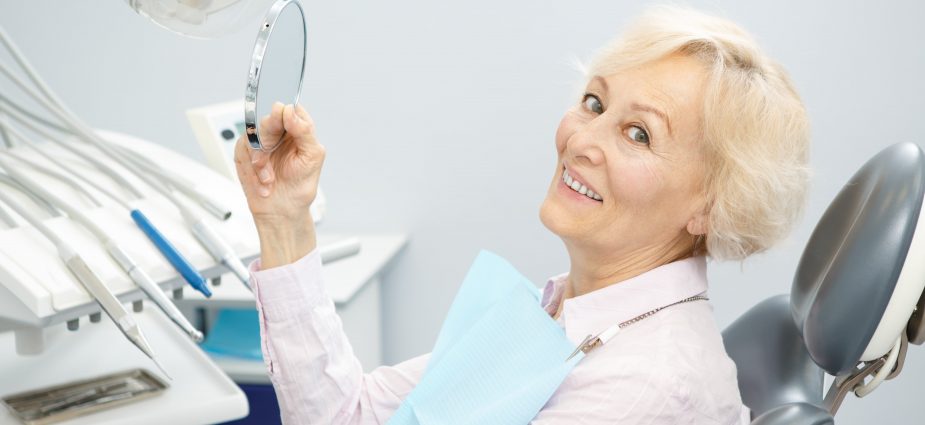
Contents:
The adjustment rate to dentures is individual. It also depends on the type of restoration, the number of teeth to be replaced, the physiological characteristics of your mouth, and your general state of health.
Modern removable dentures are dental restorations that replace lost teeth, are removable, and can be easily fitted by the patient. Doctors distinguish between fully and partially removable models.
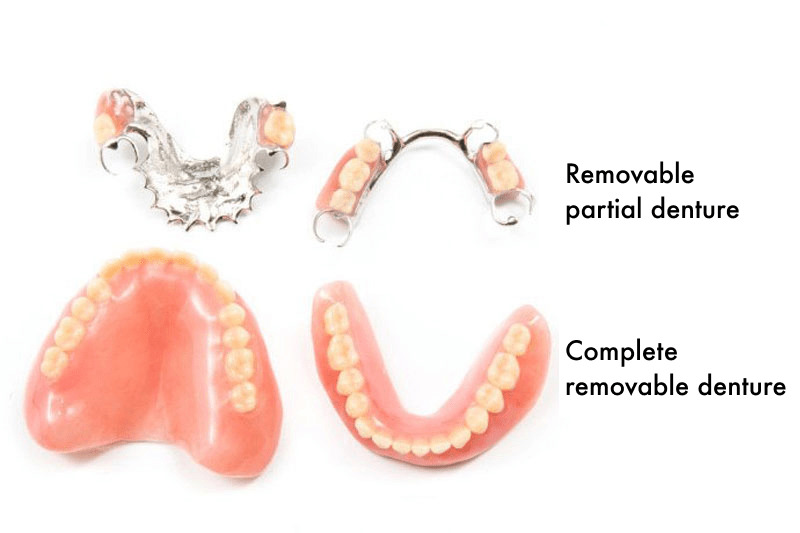
The indications for removable dentures are complete or partial adentia on one or both jaws and a period of adjustment to fixed dentures. The prostheses perform all the functions of the patient’s teeth: masticatory, articulatory, and aesthetic. In addition, it allows the patient to eat, speak and smile. Full dentures are used when all of the elements of the dental arch are lost, and partial dentures are used when one or more teeth are extracted.
The main types of removable dentures are as follows:
- Acrylic lamellar prosthesis. They consist of a plastic base covering the palate with artificial teeth attached to it. The denture ensures a precise and snug fit to the gum and palate.
- Nylon. These consist of a soft, flexible nylon base to hold the plastic teeth.
- Partial denture. It consists of a metal framework covered by a plastic layer and bonds the artificial teeth together.
- Quadrotti. The equivalent of a partial denture, in which the framework is not metal but polymer.
- Acry Free. A base of a biocompatible thermoplastic material with crowns attached to it that precisely fits the gum shape.
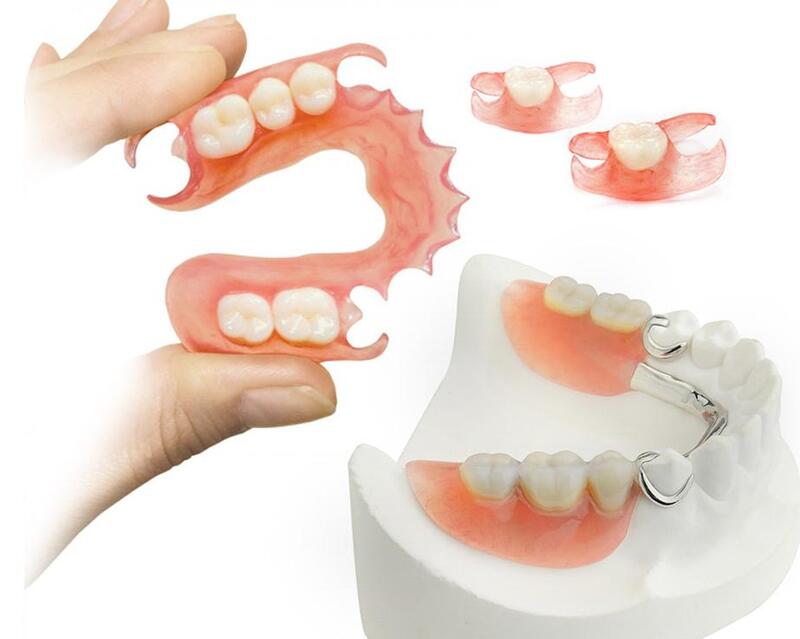
Patients who have had an orthopedic construction may face salivation, nausea, impaired diction and chewing, and altered and reduced taste of familiar foods immediately after the fitting. However, the discomfort is resolved within a few days.
Some people remove their dentures and wear them only to go out or socialize if discomfort occurs. However, doctors recommend removing the restoration as little as possible (except during hygiene procedures) and even leaving it on overnight. This will ensure a quick adaptation.
Dentists offer the following tips on how to get used to the dentures faster:
- Spend as much time as possible with the dentures on.
- Do exercises to restore diction (reading aloud, speaking out loud, and pronouncing certain “tricky” sounds).
- Suck candies.
- Eating while wearing dentures (except for hard and viscous foods: nuts, seeds, pits, toffee candies). In the first few days after the prosthesis, eat liquid and soft food, e.g., soup, yogurt, mashed potatoes, and porridge. Avoid biting into food and cut it into pieces. Instead, try to chew on both sides of the mouth.
- Use adhesive creams and gels to keep the restoration in place.
- Massage the gums.
- Rinse the mouth with herbal decoctions (chamomile, sage).
In rare cases, symptoms such as sore gums, sores, ulcers, swelling and redness, difficulty swallowing, and a burning sensation may occur after the prosthesis placement. If you experience these reactions, you should visit your dentist immediately. Allergic reactions, infections, or poor-quality dentures can cause them.
Can I Chew with Removable Dentures
Modern prosthetic technology restores all functions of lost teeth. Patients with removable dentures can and should chew their usual foods. This prevents bone atrophy, allows for faster adaptation to the prosthesis, and improves the quality of life.
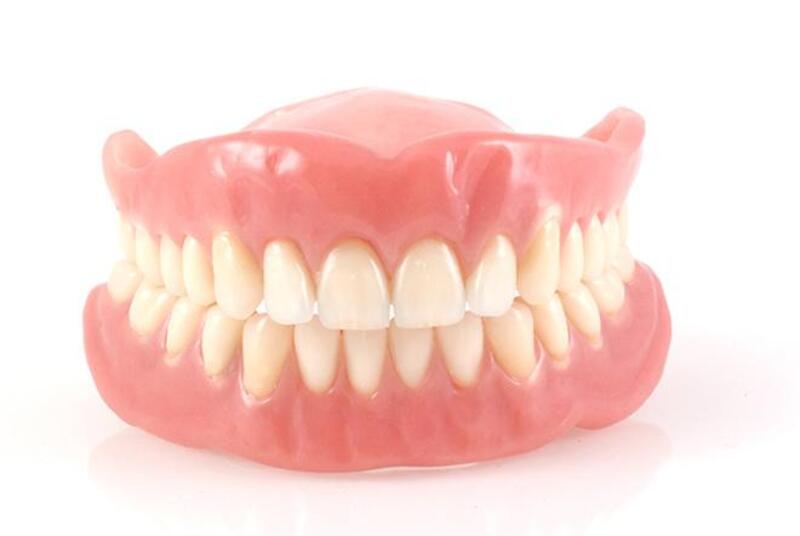
Avoid hard and viscous foods and keep your mouth clean. If food particles get under the denture, remove them and rinse the prosthesis.
Some types of materials used in the fabrication of dentures darken and become scratched over time, affecting their appearance. Patients should avoid staining foods and beverages (certain berries, staining caramels, coffee, and tea) and clean the prosthesis thoroughly after meals.
If removable dentures fully restore the function of lost teeth, why place implants?
Implant surgery has several advantages over removable dentures:
- improved comfort when chewing food and speaking;
- aesthetics;
- easy care;
- no loss of bone volume;
- durability.
Patients with contraindications to fixed prostheses, including implants, choose removable prostheses.
Implants feel like natural teeth – they do not cause discomfort or rubbing, and they don’t slip.
The patients for whom fixed prostheses, including implants, are contraindicated choose removable prostheses.
The following are considered absolute contraindications:
- autoimmune diseases and cancer;
- blood disorders;
- tuberculosis;
- HIV;
- mental disorders;
- diabetes mellitus;
- osteoporosis;
- Lupus erythematosus;
- maxillary sinusitis etc.
In such cases, removable dentures are the best solution for restoring missing teeth.
How Long Do Teeth Hurt after Dentures Placement?
After the proper and professional fabrication of removable dentures, pain is eliminated. If it still occurs, the reason is not the dentures but previous dental manipulation; its intensity is less than a slight discomfort, rather a squeezing sensation. Mild pain usually goes away within a day or two. Light massage of the gums, gargling, and speech exercises can help reduce the discomfort.
Suppose a removable denture was placed shortly after the tooth extraction, and there was not enough time for the wound to heal and repair the tissue fully. In that case, you may experience discomfort while wearing the prosthesis.
Intense pain, swelling, redness, and wounds indicate an urgent need to visit a dentist to correct or replace the denture. While waiting for the appointment, the denture can be removed.
Remember to follow proper oral hygiene when wearing the denture and regularly clean the restoration. After meals, the denture is rinsed with water and cleaned in the morning and evening with a soft, gentle toothbrush and non-abrasive toothpaste for children. Once a week, it is treated with a special antiseptic agent.
Neglected care leads to the accumulation of dirt, which becomes food for pathogens that cause oral infections. In addition, deposits of solid food residues can damage the denture itself, causing discoloration, scratches, and stains, reducing its lifespan and worsening its appearance.
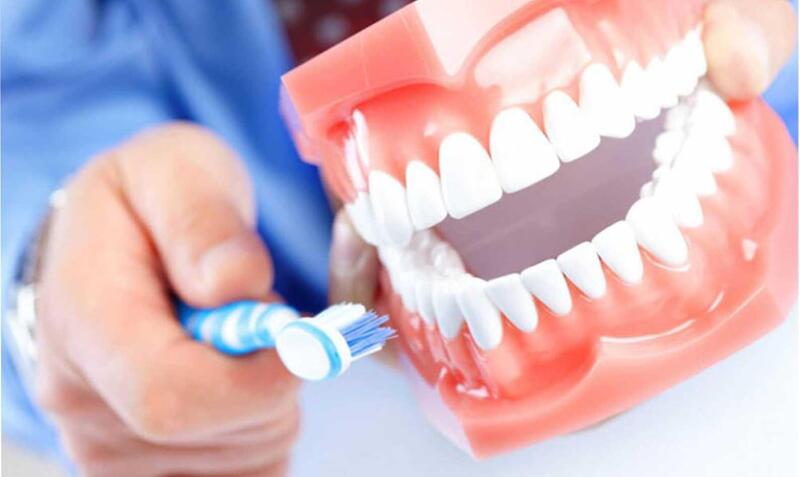
How Long Does it Take to Get Used to Removable Dentures?
When analyzing denture types, it is worth remembering that the shortest adjustment period is with partial dentures, and the longest is with plate dentures. This is due to its structure and attachment.
Dentures are fixed firmly to the gums and palate and can shift during chewing, laughing, or speaking. Patients are recommended to use adhesive gels to prevent this.
Getting used to the removable denture usually takes a few days or a week. The longest time is up to 1 month. After this period, people feel no more discomfort and can speak and eat without difficulties.
The same type of restoration has a varying length of the adjustment period that depends on the total number of teeth to be replaced and the location of the restoration. For example, the upper denture bugle prosthesis requires more adjustment time than the lower denture. Therefore, if you experience discomfort after a month of wearing the denture, it is worth consulting your doctor to determine and correct the cause.
During the entire period of wearing the removable denture, there is a slow loss of bone tissue. Therefore, it is advisable to visit your dentist once a year to reline the restoration by adding plastic to the areas with voids and loose contact with the mucosa. This improves the fixation of the product and increases the comfort of use. In addition, Corega gel or its analogs can be used before the doctor’s visit.
A proper psychological attitude is essential for the acceptance of the prosthesis. It is important not to concentrate on the sensations, tries to lead an everyday life, talk, chew food, and keep the prosthesis in place. Patients who actively use the prosthesis get used to it within a few days and stop feeling it as a foreign body.
A quality denture requires minimal adjustment time and lasts several years, providing comfort and aesthetics to the smile.

